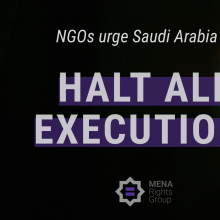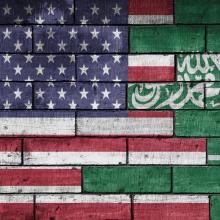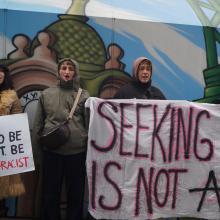July 15, 2025

Ramlah Dahmani © HuMENA for Human Rights and Civic Engagement / via HUMENA
The undersigned organizations express their strong condemnation of the in absentia verdict issued on 1 July 2025 against activist Ramlah Dahmani, sentencing her to two years in prison with immediate enforcement. The ruling was issued under Article 24 of Decree No. 54 of 2022, which criminalizes the dissemination of “false information” via communication networks, a provision that is overly broad and vague, and has been systematically used to suppress peaceful expression and legitimate criticism. The charges stemmed from public statements in which Dahmani addressed the conditions of detention of her sister, lawyer, and political commentator, Sonia Dahmani. Furthermore, the issuance of the sentence in absentia, without ensuring the accused's presence or right to a defense, constitutes a grave violation of the right to a fair trial as guaranteed under Article 14 of the International Covenant on Civil and Political Rights (ICCPR).
This ruling is the latest example of the Tunisian authorities’ instrumentalization of Decree 54 as a tool to restrict freedom of expression, silence dissent, and criminalize acts of solidarity. It comes within the broader context of an unprecedented crackdown on public freedoms in Tunisia since 2021, whereby exceptional legal texts, foremost among them Decree 54, have been routinely used to target human rights and political expression, in clear breach of the principles of legality and the prohibition of abuse of law to criminalize fundamental rights and freedoms. This pattern has been accompanied by increasing restrictions on civil society, the erosion of legal profession independence, and growing pressure on independent media.
The sentencing of Ramlah Dahmani for exercising her legitimate right to express concern over the violations committed against her sister represents a serious breach of international human rights standards, including General Comment No. 34 of the UN Human Rights Committee on Article 19 of the ICCPR, the African Charter on Human and Peoples’ Rights, and the UN Declaration on Human Rights Defenders.
Dahmani’s statements cannot be viewed as mere personal opinion; they fall within the broader framework of families exercising their right to expose abuses against their relatives, a fundamental extension of the role of human rights defenders. Nonetheless, judicial authorities chose to prosecute her without initiating any independent or effective investigation into the allegations of ill-treatment, in clear violation of the UN Principles on the Effective Investigation of Grave Violations of Human Rights and the right to an effective remedy.
This case cannot be separated from the broader context of judicial escalation in Tunisia, where Decree 54 has been systematically deployed against journalists, unionists, activists, and family members of political detainees. The aim is to dismantle social solidarity networks and isolate detainees from public scrutiny. It also reflects an alarming pattern of intensified repression targeting women human rights defenders and the silencing of women’s political and social presence in public life.
The sentence handed down against Ramlah Dahmani epitomizes a pattern of retaliatory punishment aimed at silencing defenders, intimidating relatives, and suppressing the circulation of information on rights violations. It reflects a systematic disregard for Tunisia’s constitutional and international obligations, including those undertaken before the UN Human Rights Council and treaty bodies. Article 31 of the Tunisian Constitution guarantees freedom of opinion and expression. At the same time, Article 49 stipulates that any restrictions must be justified according to the principles of necessity and proportionality, conditions clearly not met in this case.
We, the undersigned organizations, consider this ruling a dangerous precedent in the use of exceptional legislation to criminalize legitimate solidarity and redefine it as a "cybercrime.” This represents a compounded violation of defenders’ rights and contributes to the entrenchment of a climate of fear and enforced silence through legal persecution.
Accordingly, we:
- Call on the Tunisian authorities to immediately and unconditionally overturn the conviction against Ramlah Dahmani and halt all related judicial proceedings, as the ruling constitutes arbitrary punishment undermining fair trial guarantees and freedom of expression.
- Demand the immediate suspension of Decree No. 54 and the launch of a legislative review process to bring it into full compliance with Tunisia’s international human rights obligations, particularly the ICCPR, with a view toward its full repeal, given its systematic use as a tool of repression.
- Hold the Tunisian authorities fully accountable for targeting women human rights defenders, including through prosecution based on familial ties to prisoners of conscience. We affirm that such practices constitute prohibited forms of political retaliation under international law.
- Urge the UN Special Rapporteurs, particularly those on the situation of human rights defenders and on the promotion and protection of the right to freedom of opinion and expression, to urgently take up this case, issue formal communications to the Tunisian government, and include this incident in their upcoming reports as a marker of serious deterioration.
- Call on the EU and all international partners of Tunisia to condition any form of political or financial cooperation on tangible human rights benchmarks, including safeguards to prevent judicial assistance or technical support from being misused to undermine judicial independence or suppress civil society and human rights defenders.
The continued targeting of women human rights defenders, the criminalization of family ties, and the use of the judiciary as a tool of intimidation will only deepen Tunisia’s human rights crisis. Such practices hollow out constitutional guarantees and entrench institutional and legal decline, effectively dismantling any credible pathway to democratic governance based on the rule of law and respect for fundamental rights.
Signatory Organizations:
- HuMENA for Human Rights and Civic Engagement
- Intersection Association for Rights and Freedoms
- Innovation for Change - MENA Hub
- Skyline International for Human Rights (SIHR)
- Committee to Protect Journalists (CPJ)
- ADALA FOR ALL Association
- MENA Rights Group (MRG)
- People in Need
- CALAM
- Vuka! Coalition for Civic Space
- Organisation Tchadienne Anti-corruption (OTAC)
- The Tahrir Institute for Middle East Policy (TIMEP)






